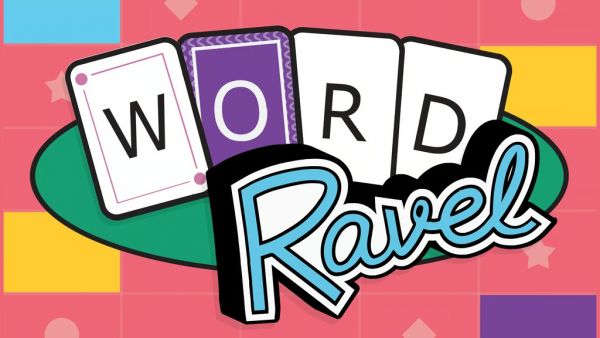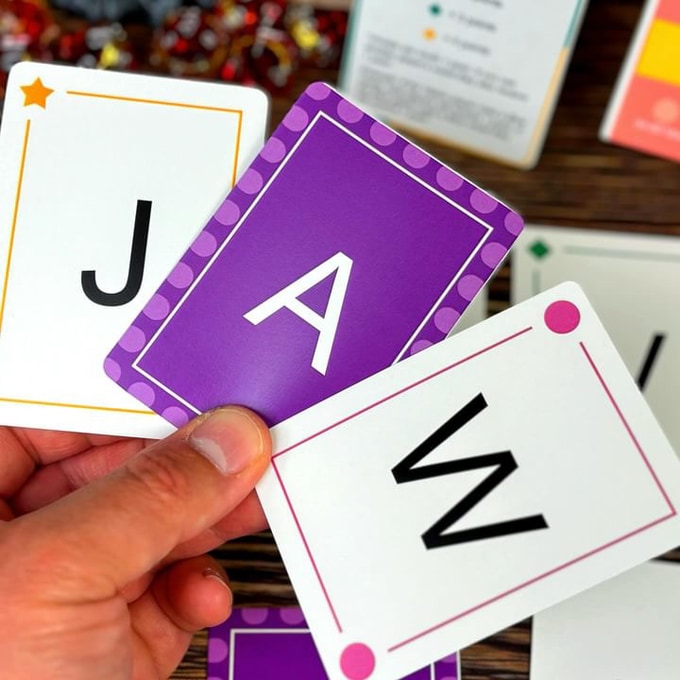Preview: Shift, Spell, and Score in Word Ravel

Each round, shift the grid three times in an attempt to create a high-scoring word. Make every word count, though, as you only make three words per game!
Currently on Kickstarter, Word Ravel is a puzzle word game for 2-4 players and is published by Mind the Gap Studios.

Gameplay
Each player takes a vowel deck in their player color. 21 consonant cards are dealt into a pile face-down. Each player then draws two vowels from their decks and chooses one to add to the face-down pile. If playing with fewer than 4 players, extra vowel cards are added from the leftover vowel decks until there are 25 cards in the pile. The pile is then shuffled and dealt out into a 5-by-5 grid, face-up.
On a player’s turn he can make three shifts of the grid. A shift is choosing one of the outmost cards of a row or column, removing it, shifting all cards in that row/column over to fill the empty space, and then placing the taken card into the new empty space created by the shift.
After the active player finishes making shifts, he can form one 3-5 letter word. The cards in the grid must spell out the word, and the letters must be in the correct order in either direction, in a straight line either vertically, horizontally, or diagonally. When a player makes a word, he takes the cards out of the grid and adds them to his score pile.
Consonant cards are then drawn from the main deck to create a refill pile, one for each consonant that was in the created word. All players then draw two vowel cards from their decks. If a player’s vowel was used, he then adds one of the vowels to the refill pile and puts the other on the bottom of his deck. If a player’s vowel is still in the grid, he may instead choose to swap it with one of the two vowels he drew.
The refill pile is then shuffled and used to refill any empty spaces in the grid, and it is now the next player's turn. There are always 21 consonant cards and four vowel cards in the grid at the start of a player’s turn. After each player has taken three turns, the game ends and players count up their points. Different letter cards are worth a different number of points, ranging from one to four. A player also scores one point for each of his vowel cards that another player used.

Review
Word Ravel is a clever blend between word game and puzzle. It’s a very thinky, brain teaser of a game, as players study the grid and try to figure out the best way to slide letters to create the best words. Since words can be created diagonally too, and letters can be in order either backwards or forwards, there are lots of combinations to consider, and so players have to plan their moves carefully.
The scoring system is interesting and combines nicely with the puzzle of the game. Players are looking to create words with the higher scoring letter cards, but players might also try to avoid using opponents’ vowels or at least a vowel belonging to a player in the lead.
The point values of the cards are shown by shapes. This does slow down the game a bit as you have to check how many points each shape is worth. It would have been more convenient to just show the numbers on the cards themselves.
At the full player count, there is going to be some downtime, since turns are slow and thoughtful. You can examine the grid and look for possible words while waiting for your turn, but the board is going to be constantly evolving, so this is only going to be helpful up to a point. But we enjoyed the pace of the game. It’s slow, thoughtful, and satisfyingly challenging.
We quite enjoyed our time with Word Ravel. It’s a relatively compact game, and the premise is engaging and unique. It feels a little bit like a word game you might find on your phone, turned into a tabletop experience. If you enjoy word puzzles, this is a clever one that will certainly make you think. Check it out on Kickstarter!
Pros: Good scoring system that combines nicely with the puzzle of the game
Cons: Would have preferred point values to be listed on the cards, some downtime at higher player counts
Disclosure: This is a paid preview of an unpublished prototype of this game, which is subject to change prior to publication.




